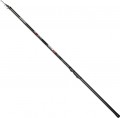Rod action
The action the rod matches. This parameter is often associated with spinning models (see “Type”), but it can also be indicated in other varieties.
Action characterizes the overall rigidity and elasticity of the rod blank - the main working part located between the handle and the upper end. In practice, the characteristics of bending and straightening during casting depend on this indicator. The
“faster” the action of the rod, the stiffer it is, the smaller part of it (counting from the upper end) bends when casting and the faster the structure returns to its original state. Conversely, a slow action means that the rod bends almost along its entire length and returns back at a relatively low speed.
If we talk about specific numbers, then models that bend 1/3 of the length or less are considered
fast, and models
that bend 2/3 of the length or more are classified as slow. Between these numbers there are intermediate indicators:
medium-fast,
medium and
medium-slow.
The progressive or complex system stands apart from others. The main feature of such rods is that when casting, they work as a fast-action rod, and when fishing for large prey, they exhibit the properties of a medium or even slow action, bending as t
...he load increases in the shape of a parabola and at the same time dampening the jerks of the fish. Progressive rods combine the advantages of fast and slow blanks in one bottle, but they are more expensive than their traditional counterparts.
The choice of fishing rod depends primarily on the expected fishing conditions. Thus, fast models are well suited for situations where there is no space for a swing - they allow you to throw the bait quite far due to just one movement of the wrist. Such products are considered more accurate; with a fast rod it is easier to throw the bait into a “window” among the algae or other small place. In addition, the rigidity provides good sensitivity when retrieving and playing. In turn, a slow action requires space for the swing, but allows for greater casting distance and reduces the likelihood of line breakage during sudden jerks of prey. Well, we should also not forget about the personal preferences of the fisherman - after all, the effectiveness of casting largely depends on the overall convenience of the rod.Tip type
The type of tip provided in the design of the rod.
This parameter is relevant mainly for spinning rods (see "Rod type"). The tip is the very tip of the rod; the characteristics of this part largely determine the features of the use of spinning. Nowadays, two main types of tips are used —
Solid Tip (pasted) and
Tubular Tip (hollow), here are their main features:
— Pasted (Solid Tip). A tip glued into the rod that does not have cavities and is usually made of fibreglass or a special type of carbon fibre. Such tips are very flexible and are mainly used for jig and microjig — fishing using special lures and sinkers, as well as a special (actually "jig") wiring technique. One of the key advantages of Solid Tip in this application is a clear “shooting” (jump) of the tip when lowering the bait to the bottom; this moment is important for the control of jig gear.
— Hollow (Tubular Tip). Traditional hollow (tubular) tip. Such a tip is noticeably stiffer than the Solid Tip, and is intended mainly for twitching fishing — wiring lures, wobblers and other similar nozzles. With this type of fishing, you often have to pull the bait hard or move it in jerks, and due to the high rigidity of the Tubular Tip, it is optimally suited for this fishing technique: a rod with such a tip does not bend as much as with a Solid Tip, and allows you to precisely control the lure.
— Hybrid (Hybrid tip)
.... The lower part of the hybrid tip is hollow to about the middle (Tubular), and above it is solid (Solid). She is moderately rigid, and bending in one sitting. It is used as a universal solution for various fishing techniques.
Note that individual models of rods can be equipped with two types of tips at once, with the possibility of installing them at the request of the user. However, such equipment is rare: spinningists usually select tackle for specific conditions and fishing style.Max. casting
The maximum weight of the entire rig (including bait, weights, hooks, etc.) that the rod can handle. This parameter is not recommended to be exceeded: the structure will be subjected to off-design loads and wear out a lot, to the point that the rod can simply break during a normal cast. In addition, the off-design weight of the casting significantly reduces the range and accuracy of the cast, which is critical, in particular, in spinning and match fishing (see "Rod type").
Min. casting
The minimum weight of equipment (lures, sinkers, hooks, floats, etc.) with which the rod will work effectively. Compliance with this parameter is important, first of all, for types of fishing that require high accuracy, for example, match or spinning (for more details, see "Rod Type") — a rig that is too light will not allow you to cast the rod far enough and accurately.
Folded length
The length of the rod when folded. This parameter primarily affects the convenience of transportation: the shorter the folded rod, the easier it is to carry / transport.
